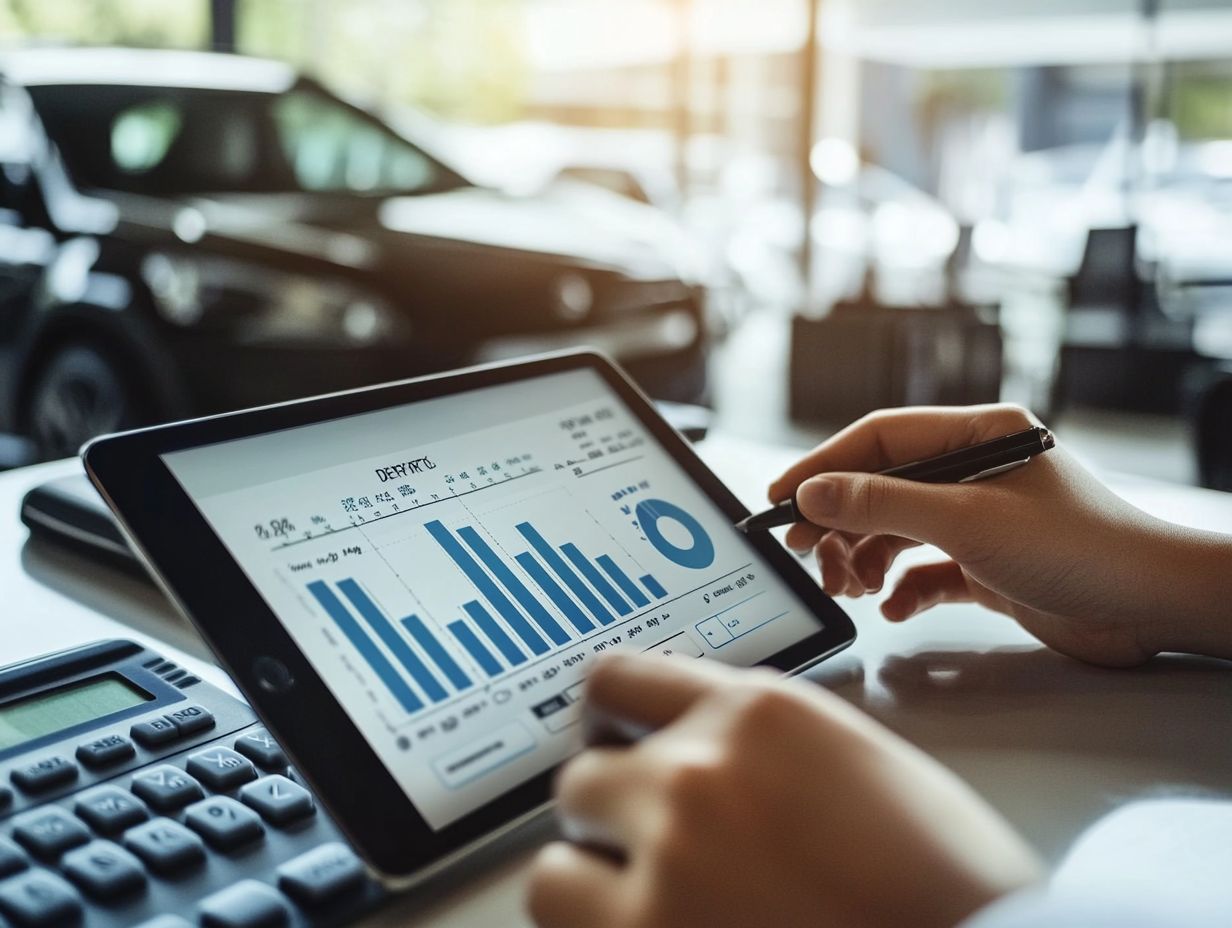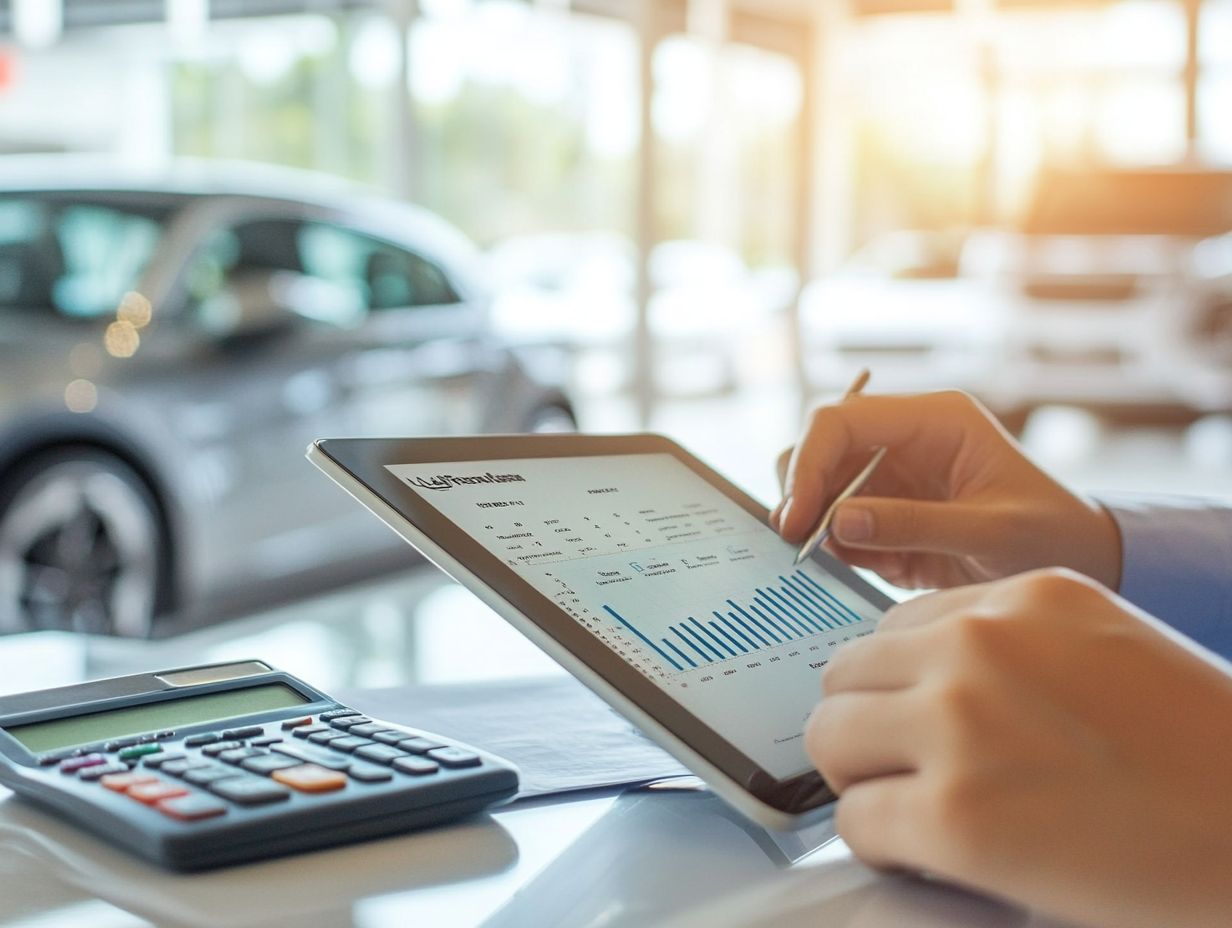Understanding New Car Depreciation Rates
When you’re in the market for a new car, grasping the concept of depreciation is essential for making a smart investment.
Depreciation plays a significant role in your vehicle’s value over time, influenced by factors like brand reputation and market trends.
This article delves into the intricacies of car depreciation, examining the key elements that affect rates and offering methods for calculating depreciation effectively.
Get ready to uncover practical tips that will help you save money on your new vehicle, along with a comparison of depreciation rates among popular car brands.
Prepare to elevate your car-buying expertise!
Contents
- Key Takeaways:
- What is Car Depreciation?
- Factors Affecting Car Depreciation Rates
- Understanding How Car Value Decreases Over Time
- How to Minimize Depreciation on a New Car
- Depreciation Rates for Popular Car Brands
- Frequently Asked Questions
- What are new car depreciation rates?
- How are new car depreciation rates calculated?
- Why is understanding new car depreciation rates important?
- What factors influence new car depreciation rates?
- Can new car depreciation rates be minimized?
- How can I find information on specific new car depreciation rates?
Key Takeaways:

- Car depreciation is the decrease in value of a vehicle over time due to age, mileage, and market demand.
- Key factors that affect car depreciation rates include model popularity, brand reputation, and maintenance history.
- By understanding how to calculate depreciation and implementing tips like proper maintenance, you can minimize the impact on your new car’s value.
What is Car Depreciation?
Car depreciation refers to the gradual decrease in a vehicle’s value over time, profoundly influencing your experience as a car owner. This process is shaped by factors like the initial price you paid for your vehicle and how market conditions affect its resale value.
Grasping the nuances of car depreciation is crucial. It not only determines the vehicle’s worth over time but also significantly influences decisions regarding selling your car or trading it in for a new one. Understanding this enables you to make informed choices that benefit your financial landscape.
Definition and Explanation
Car depreciation is essentially the decline in your vehicle’s value as it ages, shaped by factors like mileage, market conditions, and the make and model of the car.
This decline begins the moment you drive your new car off the dealership lot, often leading to a noticeable decrease in value right away. For many drivers, understanding this natural depreciation is vital; it affects not just your resale potential but also your insurance premiums and overall investment in the vehicle.
Factors such as maintenance history, geographical location, and even fuel efficiency can influence how quickly and significantly your car depreciates. Being aware of these elements helps you make informed decisions, whether you plan to keep your vehicle for years or consider a future sale.
Factors Affecting Car Depreciation Rates
Several key factors influence car depreciation rates. For instance, mileage plays a significant role in how quickly a car loses value, while accidents can dramatically diminish a vehicle’s worth.
Consumer preferences for fuel economy vary greatly among different car brands, impacting depreciation. Generally, reliable car brands experience slower depreciation rates.
Regular oil changes and proper maintenance significantly help minimize value loss over time.
Key Influences on Depreciation

Key influences on car depreciation include market conditions, mileage driven, and the importance of regular maintenance. These factors are crucial in shaping a vehicle’s resale value.
Market conditions can fluctuate dramatically based on economic indicators like interest rates and consumer demand. In a buyer’s market, vehicles can lose over 20% of their value within just the first year. Higher mileage typically indicates more wear and tear, often leading to diminished interest from potential buyers.
Consistent maintenance not only keeps your vehicle in prime condition but can also enhance its resale value. Studies show that cars with comprehensive service records can sell for up to 15% more than those with vague maintenance histories.
By understanding these interconnected factors, you can gain a clearer picture of how to maximize your vehicle’s worth over time.
Are you ready to maximize your car’s value? Start applying these tips today and watch your investment grow!
Understanding How Car Value Decreases Over Time
As a car owner, grasping how car value decreases over time is essential for estimating your vehicle’s worth. This is especially crucial during the first year, as new cars tend to lose value the fastest.
Using online tools that help you figure out your car’s value will allow you to make better financial decisions when buying or selling your vehicle.
Methods for Calculating How Car Value Decreases
There are several methods for calculating depreciation, including the straight-line method and the declining balance method. Each offers unique insights into how mileage impacts your car’s worth.
The straight-line method spreads the depreciation cost evenly across each year. This straightforward option is great for budgeting and works well for assets like fleet vehicles used for delivery services that experience a steady loss in value.
In contrast, the declining balance method applies a fixed percentage to the asset’s book value each year, allowing for greater depreciation in the earlier years. This method is perfect for fast-changing assets like machinery or technology, where rapid obsolescence is a concern.
Understanding these methods helps you make informed financial decisions about your vehicle’s value retention, whether you’re an individual owner or a business operator.
How to Minimize Depreciation on a New Car
Minimizing depreciation on a new car is crucial for protecting your investment. Here are some strategies to consider:
- Follow savvy car-buying tips
- Ensure your vehicle is well-maintained
- Embrace safe driving habits
Taking a proactive approach in these areas can significantly reduce the costs associated with car ownership and help maintain your vehicle’s value.
Tips for Reducing Depreciation

To effectively reduce car depreciation, implement maintenance tips and adopt safe driving practices to enhance your vehicle s resale value.
Regularly servicing your car at the recommended intervals ensures it runs smoothly. It also signals to potential buyers that it has been well cared for. Simple driving habits like avoiding rapid acceleration and hard braking help minimize wear and tear, preserving your vehicle’s overall condition.
When making purchasing decisions, choose models known for their reliability and lower depreciation rates. For long-term benefits, opt for colors such as silver or black, which often have higher resale values and attract more buyers in the competitive marketplace.
Depreciation Rates for Popular Car Brands
Depreciation rates can vary widely across popular car brands. Some reliable manufacturers showcase impressively low rates over time. Esteemed sources like Kelley Blue Book and Edmunds provide compelling estimates that highlight these trends.
By understanding this valuable information, you can make informed choices when purchasing new or used cars, ultimately maximizing your investment and enhancing your automotive experience.
Act now to protect your investment! Share your own tips or check out additional resources on car ownership and maintenance.
Comparison of Car Value Loss Over Time
A comparison of how much a car loses value over time among popular brands reveals significant disparities shaped by market trends and the reliability of specific models. This ultimately influences your choices as a consumer!
For instance, luxury brands like BMW and Mercedes-Benz often experience faster value loss compared to mass-market vehicles such as Toyota and Honda. These brands are frequently sought after for their renowned durability and lower maintenance costs.
This difference can significantly impact your decision-making. If you’re looking for a long-term investment, you might gravitate towards brands known for their slower depreciation. If you’re budget-conscious, consider the initial purchase price first.
By understanding these dynamics, you enable yourself to make informed decisions! This ensures you select a vehicle that not only meets your needs but also retains its value in the fiercely competitive automotive landscape.
Watch this video to learn more about car depreciation!
Frequently Asked Questions
What are new car depreciation rates?

New car depreciation rates refer to the decrease in value of a new vehicle over time. Understanding new car trade-in value is a natural and expected occurrence, as all assets lose value as they age.
How are new car depreciation rates calculated?
New car depreciation rates are typically calculated by taking the original purchase price of the vehicle and subtracting its estimated resale value at the end of a certain time period. For those interested in buying used cars, understanding used car depreciation is crucial. This difference is then divided by the number of years in the time period to determine the annual depreciation rate.
Why is understanding new car depreciation rates important?
Understanding what to know about new car depreciation rates is important because it can significantly affect the overall cost of owning a vehicle. By being aware of the expected depreciation, individuals can make informed decisions when purchasing a car and budget for any potential losses in value over time.
What factors influence new car depreciation rates?
Several factors can influence new car depreciation rates, including the make and model of the vehicle, its age and mileage, market demand, and general wear and tear. Higher-end luxury vehicles and rare models tend to have lower depreciation rates, while popular and common vehicles may depreciate at a faster rate.
Can new car depreciation rates be minimized?
While new car depreciation rates cannot be completely avoided, there are steps you can take to minimize them. This includes researching and selecting a vehicle with a lower depreciation rate, maintaining the vehicle well, and potentially investing in add-ons or upgrades that can increase its value over time.
How can I find information on specific new car depreciation rates?
Many online resources and guides offer information on new car depreciation rates for specific makes and models. It’s also recommended to consult with a trusted car dealer or appraiser for more accurate and personalized estimates.
Ready to make an informed choice about your next car purchase? Explore our buying guides for more insights!






